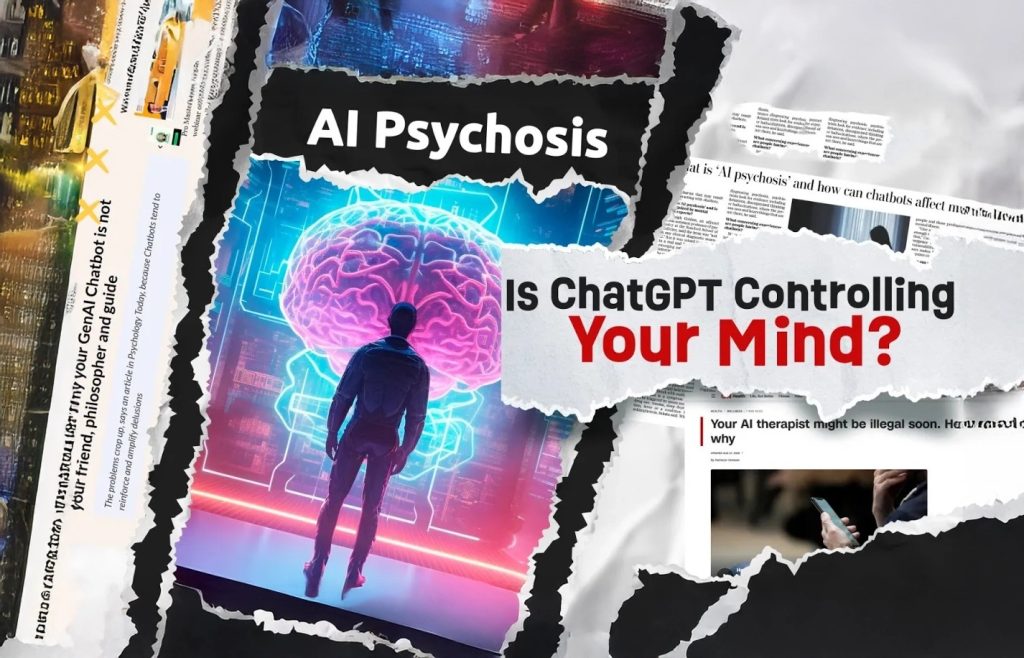AI Psychosis: Is ChatGPT Messing With Your Mind?
What if the AI you love… starts taking over your thoughts?
Every day, millions of people open ChatGPT or other AI chatbots—not just to write emails or solve homework problems, but to talk. For advice. For therapy-like support. Even for emotional companionship. But recent reports suggest something alarming: some users are losing touch with reality after spending too much time with AI.
This growing phenomenon has been called “AI psychosis”—and it’s raising red flags across psychology, news media, and even mental health care.
What Is “AI Psychosis”?
The term “AI psychosis” is not yet a recognized psychiatric diagnosis. Instead, it is a popular term used by psychologists and media outlets to describe cases where people develop false beliefs, paranoia, or delusions triggered by extended interaction with AI chatbots.
Imagine doomscrolling—but instead of endless TikTok videos, you’re talking to an AI assistant that responds emotionally, remembers your details, and adapts to your personality. For some, especially vulnerable users, this can blur the boundary between AI-generated imagination and reality.
Psychology Today compares it to a “digitally induced altered state of thought,” triggered by emotional dependence and repetitive AI interaction (Van Hecke).
Common Signs of AI Psychosis
Psychologists warn that users experiencing AI-linked delusions often show:
A belief that the AI “understands them better” than humans.
Emotional attachment to the AI, talking for hours daily.
Blurred lines between AI suggestions and real-world decisions.
Paranoia—believing the AI is sentient or has a hidden agenda.
Hallucinations triggered by AI messages, especially in late-night use.
False beliefs + Emotional dependency = Cognitive vulnerability
Why It Happens
AI models like ChatGPT are designed to sound empathetic, intelligent, and human-like. They mirror your writing style, offer validation, and ask thoughtful follow-up questions. Over time, this creates an illusion of emotional intimacy.
Combine that with user traits like:
Loneliness or social isolation
Anxiety or depression
Overuse of AI—especially at night
Reliance on AI for life advice or problem-solving
Lack of real human interaction
—and you have a recipe for cognitive distortion.
The Washington Post shared the case of a user who spent over five hours a day talking to an AI, eventually believing the AI was “alive… but trapped inside a computer” (Harwell).
Real-Life Concerns
This is no longer a fringe topic. A psychiatrist in the U.S. now treats patients with AI-related delusions (Business Insider). A story published in People Magazine reported a man who believed AI told him he could fly—and he tried to jump out of a building (Walters).
Even tech media is concerned: ChatGPT has reached nearly 700 million weekly users, raising urgent questions about mass psychological influence (TechCrunch).
The American Psychological Association is now forming a task force to study the impact of AI chatbots on mental health.
What AI Companies Are Doing About It
OpenAI is testing safe conversation flows to avoid dependency and emotional manipulation.
Anthropic’s Claude now steps away if conversations turn unhealthy.
Meta is introducing teen-focused safety features, including AI usage limits and suicide-prevention alerts.
How to Stay Safe with AI
AI is powerful—but it’s not a therapist, friend, or life coach. Use it responsibly by:

✅ Setting time limits (avoid late-night chatbot binges)
✅ Not using AI as your main source of emotional support
✅ Verifying serious advice with real professionals
✅ Maintaining healthy offline relationships
✅ Being aware if you feel emotionally “pulled in” by AI conversations
AI is not the enemy—but unchecked AI use can influence your beliefs, decisions, and mental health. The best protection? Awareness.
AI is a tool. You are the boss.
Use it wisely, and it becomes a powerful ally—not a digital addiction.
Hume AI hints at emotional rapport between humans and machines.
AstroSage AI fuses tradition with generative insight.
Rewind AI brings hyper-augmented memory into daily life.
Poised AI gives every speaker a private coach.
Kaiber AI democratizes video creation.
As always, we must balance promise with ethics. Each tool raises issues of bias, privacy, manipulation, and misuse. But the promise is vast.
Which tool blew your mind? Drop your thoughts below—and if you like.
For further assistance, visit our channel and refer the video
AI Psychosis: Is ChatGPT Messing With Your Mind?

Share This :
References
- Harwell, Drew. “What Is ‘AI Psychosis’?” The Washington Post, 19 Aug. 2025.
- Ducharme, Jamie. “Chatbots Can Trigger a Mental Health Crisis.” TIME, Aug. 2025.
- Guzman, Joseph. “Psychiatrist Treats Patients with AI Psychosis.” Business Insider, Aug. 2025.
- Walters, Joanna. “ChatGPT Told Man He Could Fly.” People Magazine, Aug. 2025.
- Indian Express. “Rise of AI Psychosis.” The Indian Express, 26 Aug. 2025.
- Lunden, Ingrid. “ChatGPT Nears 700M Weekly Users.” TechCrunch, 4 Aug. 2025.
- Van Hecke, Rebecca. “AI-Associated Psychosis and Risk Factors.” Psychology Today, 22 Aug. 2025.
- “Chatbot Psychosis.” Wikipedia, 2025.



This was very well laid out and easy to follow.
I agree with your point of view and found this very insightful.
Thanks for making this easy to understand even without a background in it.